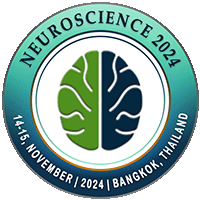Huicong Wang
Capital Medical University, ChinaTitle: Transcranial near-infrared stimulation on left DLPFC could relieve anxiety: A randomized, double-blind, sham-controlled study
Abstract
Objective: Generalized anxiety disorder (GAD) is a common neuropsychiatric disorder with reduced left dorsolateral prefrontal cortex (DLPFC) activity. Transcranial near-infrared stimulation (tNIRS) can increase cerebral cortex activity. Transcranial magnetic stimulation with electroencephalography (TMS-EEG) was used to assess the effect of tNIRS treatment on time-varying EEG brain networks.
Methods: We performed a double-blind, randomized controlled trial to evaluate the efficacy of tNIRS on the left DLPFC in patients with GAD. 36 Patients with GAD were randomly selected and divided into two groups: one group received active tNIRS and the other received sham stimulation for two weeks. Clinical efficacy was evaluated before, after, and at the 2-, 4-, and 8-week follow-ups. Twenty minutes TMS-EEG were performed before and immediately after tNIRS treatment, and healthy controls were collected only once.
Results: After treatment, the Hamilton Anxiety Scale (HAMA) scores was more reduced in the active than sham stimulation group and the difference was statistically significant (p=0.021). The HAMA scores of the active stimulation group posttreatment and at the 2-, 4-, and 8-week follow-up were 11.50 (p<0.001), 12.64 (p<0.001), 14.30 ( p<0.001), and 14.24 ( p<0.001) points lower than those before treatment, respectively. Hamilton Depression Scale score decreased significantly after active treatment and remained stable during the eight-week follow-up, but the difference of the active stimulation group and the sham stimulation group was not statistically significant (p>0.05). The difference of Pittsburgh sleep quality index scores between the active group and sham group was not statistically significant (p>0.05). Compared with before treatment, after active treatment, TMS-EEG targeting left DLPFC of patients can induce
Biography
Huicong Wang has completed her master degree in neurology and bachelor in biomedical engineering from Capital Medical University. She is the supervisor technician at Xuanwu Hospital, Capital Medical University.

